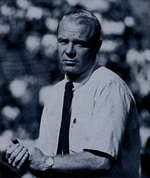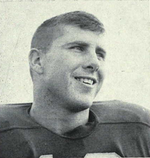1959 Michigan Wolverines football team
In its first year under head coach Bump Elliott, Michigan compiled a 4–5 record (3–4 against conference opponents), finished in seventh place in the Big Ten, and was outscored by a combined total of 161 to 122.
In mid-November, the university announced that Bump Elliott, then an assistant on Oosterbaan's staff, would take over as head coach in 1959.
[16] In May 1959, tackle Willard Hildebrand was awarded the Meyer W. Morton trophy as the player showing the most improvement during spring practice.
Michigan rallied to take a 15–14 lead on a 10-yard touchdown run by McRae and a 22-yard field goal by John Halstead.
The Spartans took a 27–0 lead at halftime on short touchdown runs by Herb Adderley, Blanche Martin, and Dean Look, and a 94-yard interception and return by Bob Suci.
The victory also broke a six-game losing streak and avoided setting a new school record with a seventh consecutive loss.
Shortly before halftime, Michigan drove to Oregon State's four-yard line, but turned the ball over on a fumble.
[23][24] At the end of the game, Michigan players carried coach Elliott off the field on their shoulders.
The Wolverines then mounted a long drive, aided by a personal foul penalty, ending with a two-yard touchdown run by Darrell Harper with 2:40 remaining in the game.
[7][26] On October 24, Michigan defeated Minnesota by a 14–6 score in the annual Little Brown Jug game before a crowd of 57,534 at Memorial Stadium in Minneapolis.
On the next play, right halfback Fred Julian carried the ball 43 yards for Michigan's second touchdown at the 10:24 mark of the third quarter.
Finally, with 1:14 remaining in the game, Minnesota averted a shutout as backup quarterback Dick Johnson threw a 14-yard touchdown pass to Tom Hall.
Quarterback Stan Noskin completed five of nine passes for 80 yards, including a 43-yard connection with Bennie McRae.
Michigan threw six of the nine interceptions (five by Stan Noskin), one short of the Big Ten single-game record.
[30] The victory crushed Illinois' bid for a Big Ten championship and trip to the Rose Bowl.
On the second play of the game, Darrell Harper fumbled at Michigan's 28-yard line, setting up an Illinois field goal.
Tony Rio scored with 64 seconds remaining in the first half on a diving catch in the end zone after a pass from Stan Noskin was deflected.
Early in the third quarter, Gerry Smith intercepted a pass and returned the ball to the Illini 26-yard line.
In the fourth quarter, Alex Callahan intercepted another Illini pass and returned it 43 yards to the Illinois 28-yard line.
Coach Bump Elliott blamed the weather, which prevented the Wolverines from flying and required them to ride buses for eight hours.
[11] On November 21, Michigan concluded its first season under Bump Elliott with a 23–14 victory over Woody Hayes' Ohio State Buckeyes.
[32] It was the final game for seniors Stan Noskin, Tony Rio, Darrell Harper, and Fred Julian who were responsible for all 23 points scored by the Wolverines.
The fumble was caused by a hard tackle from Michigan's John Halstead who was carried unconscious from the field and taken to University Hospital.
[34][35] One writer compared him to a "hot stripper" as he shed and hurled articles of clothing including his long-billed baseball cap, brown jacket, and necktie.
Center Gerry Smith was named to the AP third team, and George Genyk and Bennie McRae received honorable mention.







